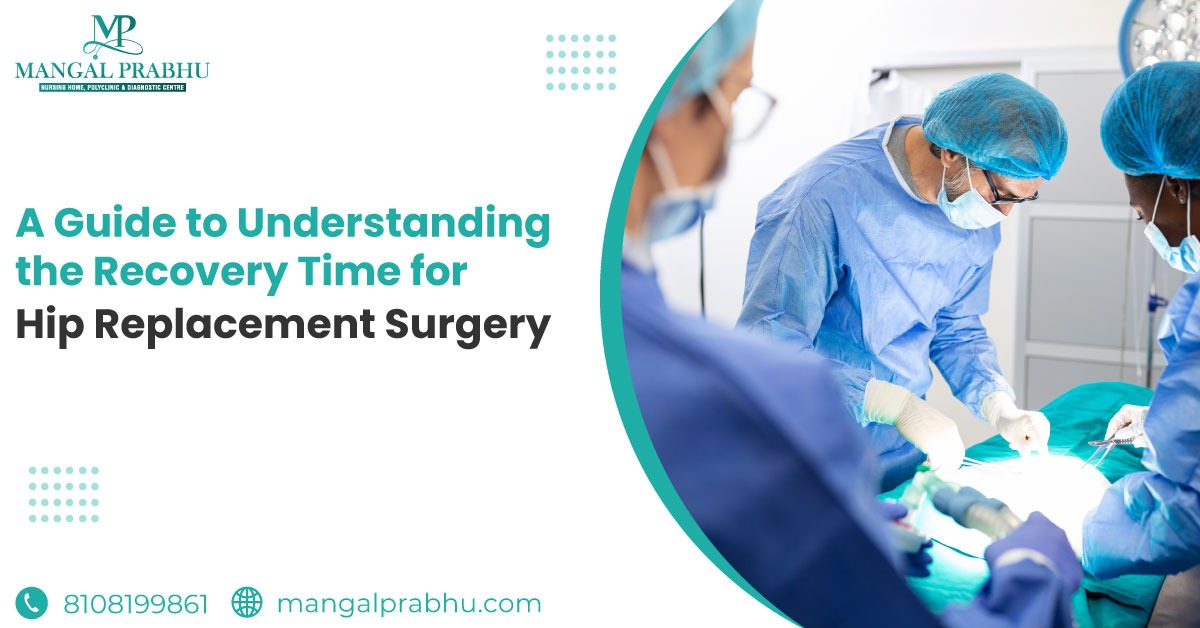
A Guide to Understanding the Recovery Time for Hip Replacement Surgery
Introduction
When it comes to recovery duration after hip replacement surgery, people are more likely to assume a more extended period than the actual recovery time. However, this guide has shed light on the recovery time and other aspects of hip replacement surgery so an individual can make a better decision before their hip surgery. Moreover, it would be best to consult with the best Hip Replacement Surgeon in Navi Mumbai from Mangal Prabhu Hospital to make a better decision regarding surgery.
Definition of Hip Replacement Surgery
Hip replacement surgery is a transformative solution for an individual suffering from the challenges of severe hip conditions. This surgical procedure helps in reducing pain and allows better flexibility, mobility, and functionality in daily work performance.
Benefits of Hip Replacement Surgery
- Patients often regain independence daily, as they can perform challenging tasks before the surgery.
- It removes the damaged part of the hip, which helps overcome chronic pain and improves quality of life.
- An individual can regain the functionality of their hip joint and can also improve mobility after the surgery. Thus, consulting with the best doctors at Mangal Prabhu Hospital for hip replacement surgery in Navi Mumbai would be the best to attain all the benefits.
Recovery Time for Hip Replacement
A. Immediate Recovery
This recovery period refers to the duration directly after the surgery when the patient is closely monitored in the hospital to avoid complications. The doctor may suggest pain management and mobility exercises during this period.
B. Short-Term Recovery
This period starts after discharge from the hospital and may last for up to six weeks. During this period, patients gradually regain mobility and begin physical therapy.
C. Long-Term Recovery
This period starts from the initial six weeks after surgery to several months or years. A patient continues therapies and other precautions to regain optimal joint function.
What to Expect During Recovery
a. Pain Management
Medications, both oral and sometimes intravenous, are prescribed to control pain levels. As healing progresses, the reliance on pain medications typically decreases.
b. Physical Therapy
Physical therapy helps in improving strength, flexibility, and joint function. Therapists guide patients through exercises that enhance mobility and stability, focusing on the hip and surrounding muscles.
c. Diet and Nutrition
A balanced diet rich in nutrients and an adequate protein intake supports muscle recovery, while vitamins and minerals contribute to overall health.
Tips for a Smooth Recovery
i. Follow the Directions of the Doctor and Physical Therapist
Adhering to the recommendations and instructions provided by the medical team is crucial. It includes taking medications as prescribed, attending physical therapy sessions, and following any activity restrictions.
ii. Listen to Your Body
It would be best to rest and perform activities according to an individual’s body needs, which helps reduce potential pain and discomfort.
iii. Maintain a Positive Mindset
Patience is vital, as improvements may be gradual. Staying optimistic and celebrating small milestones can help alleviate emotional challenges during recovery.
V. Conclusion
Hip replacement surgery offers significant benefits for individuals suffering from hip-related issues. However, it would be best to understand the recovery time and consult the best surgeon before surgery to get the best possible solution.
